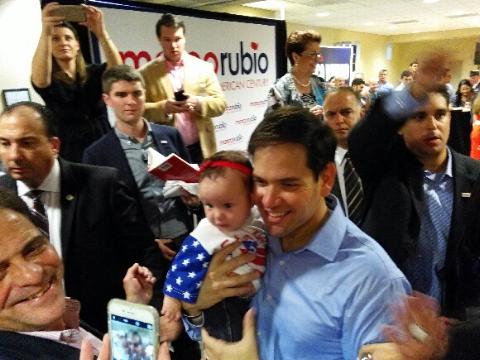I once worked at the same K-Mart on Coral Way and 87th Avenue as Marco Rubio‘s mother.
Mine started as an after school job right before the holidays and lasted through the winter break at the “trim-a-tree” department, 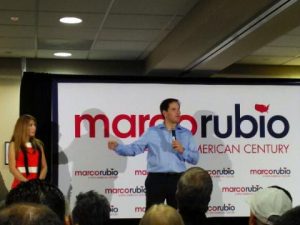 which is what they called the small area in a middle isle stacked with Christmas and holiday merchandise. I wanted to have my “own money” — that I didn’t ask my parents for — to buy vinyl records (which are back in style) and jeans with holes in them (which never went out).
which is what they called the small area in a middle isle stacked with Christmas and holiday merchandise. I wanted to have my “own money” — that I didn’t ask my parents for — to buy vinyl records (which are back in style) and jeans with holes in them (which never went out).
Not sure if we worked there at the same time, me and Sra. Rubio. I was in the 10th grade. A 15-year-old. So the senator would have been, what? Nine? It’s possible.
But whether or not we crossed our 15 minutes in the break room is unimportant. Because this new piece of information for me is simply one more example of how Marco Rubio is more like us than any other presidential candidate — not just in the 2016 election, but possibly in the history of presidents.
He came from our neighborhoods. West Miami, to be exact, which is pretty working class. He went to same public school my brother went to (my sister and I were sent to St. Brendan). He played sports at our parks. His parents worked two jobs to make ends meet.
He speaks our language — both figuratively and literally.
And that is what came through the most when Rubio spoke at the community center in his hometown of West Miami Saturday — after the mostly friendly crowd sang Happy Birthday to his wife Jeanette.
“He reminds me of my brother. He is one of us,” said one woman who was already a fan.
Read related story: Marco Rubio comes home to low-key gig for neighbors, pals
“He has a genuine feel. To me, that is unique in all the candidates,” said Sergio Diaz,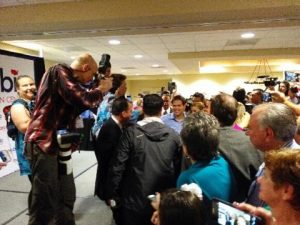 whose sister had made him come to hear her hero. It was the first time he heard Rubio speak without a TV set between them. “I feel like he could be one of my friends — one of the guys over on Sunday for football and a cook-out.”
whose sister had made him come to hear her hero. It was the first time he heard Rubio speak without a TV set between them. “I feel like he could be one of my friends — one of the guys over on Sunday for football and a cook-out.”
Just don’t serve Spam, Sergio.
“I never had a Spam croqueta. And I never will,” Rubio said to rousing laughter, referring to the canned meat Cuban refugees got in a care package when they were processed at the Freedom Tower in the early 1960s. They also got peanut butter, which most Cubans had never seen. “They put it on their face, like cream,” Rubio said.
It was one of many moments that Rubio drifted off script in what was possibly one of his most intimate and fun-loving speeches in months, maybe years.
Rubio walked in from the rain drying himself with paper napkins handed to him by a staffer and joked about the humidity. “It was hotter at the CNN debate,” he said.

“It’s great to be home,” the city commissioner turned U.S. Senator said, about a stone’s throw from his actual house. “And when I say home, I mean home. This is the park I used to play in as a child,” Rubio said on stage of the Rebeca Sosa MultiPurpose Facility, named after his political godmother, a county commissioner and former West Miami mayor.
“But there was no building then. I think the swing set was right here,” Rubio said, adding that music mogul Pitbull also played at the park and that it was where he first spotted Jeanette as he played volleyball — and immediately tried to show off. He talked about how he bought a home there after they were married, blocks from his parents.
“The water bill is due. I think that’s why the city manager is here,” he said, after he had hugged City Manager Yolanda Aguilar, who called it a “a historic moment for the history of West Miami.”
Read related story: Marco Rubio — more like us than any other POTUS wannabe
Rubio spoke to the crowd of about 500 people — many of them old friends, neighbors and political colleagues — in both English and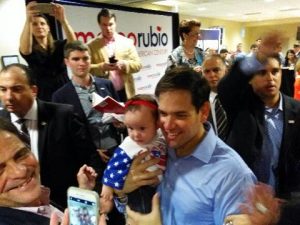 Spanish. In fact, he spoke more Spanish on this early, rainy Saturday morning than he has on maybe the whole of the campaign trail.
Spanish. In fact, he spoke more Spanish on this early, rainy Saturday morning than he has on maybe the whole of the campaign trail.
And that Spanish was effortless and almost flawless. Or as flawless as you can get in Cuban, anyway. He noted the difference on the stage when he bashed the current administration for cutting defense spending by a trillion dollars. “Trillion! How do you say that in Spanish? Not in Cuban, but in Spanish,” he asked. The crowd roared and offered him the Cuban answer anyway: “Trillon.” It’s billon, actually. But it’s close enough.
That facility with both languages is going to appeal to the few Hispanic Republican voters and, more importantly, will help peel off Latino votes from Hillary once he’s cleared the primary. We’ve never had a president who can talk to us in our own language. Jeb! Bush learned the language from his wife and speaks it well, but with considerable effort and a thick gringo accent. And Ted Cruz refuses to give even a soundbite en espanol.
Flowing effortlessly from English to Spanish and back again, Rubio covered most of his stump speech staples in bullet form.
On freedom and anti-terrorism: “The world has become a more dangerous place. This is the world we live in,” Rubio said, mentioning the terrorist attacks in San Bernadino and Paris. “The more dangerous the world is, the stronger America needs to be,” he said, adding that Obama’s proposed cuts to the U.S. Defense budget would “leave us with the oldest and smallest Air Force we’ve ever had.”
On homeland security. He waxed hopeful that the election in Venezuela the next day would bring change to their government and lashed out at the U.S. olive branch to the Castro brothers in Cuba, calling renewed relations a “one sided deal that gives them everything they want and gets nothing in return.” He called Russian President Vladimir Putin a “gangster.”
On limited government: “Our rights don’t come from the government, they come from God. The role of our government is to protect those rights, not to grant them or decide them.”
On economic liberty: “This is the only free economic system in the world where we don’t have to make rich people poor to make poor people rich,” he said, adding “sometimes out of a spare bedroom in a home… which is a violation of the West Miami code.
He had earlier told people that he started his political career on the city’s code enforcement board — a killer for a would be politician. “Because if your neighbor paints his house the wrong color now you have to fine him. It’s not good for votes.”
Read related story: Marco Rubio shines bright at Jeb-less Lincoln Day Dinner
Walking the streets of West Miami in 1998 — with Commissioner Sosa, who introduced him, at his side — showed him that other families were like his. He talked to doctors who washed dishes and professors who sewed at factories who never were able to recover their prior lives after they left Cuba. “But they adopted a new dream, to leave their children with a better life… not to let what happened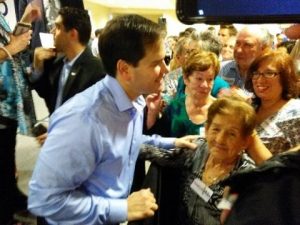 to them ever happen to their children.
to them ever happen to their children.
“The story of this community is not the story of a people who have had it easy.”
And then he emphasized his optimistic message about a new American century. “The greatest era of the history of this country lies ahead of us,” he said. “Not only will we win, but we’ll change the direction of this country and leave it better for our children.”
Then he told the mostly Cuban-American crowd that he would proudly display their culture at 1600 Pennsylvania Avenue: “Vamos a llevar una caja china a la Casa Blanca,” he said, referring to the Cuban way of roasting a whole pig in a box or a hole in the back yard, which he said he would take to the White House.
“Y, por supuesto, una cafetera,” he added, about a stove top Cuban coffee maker.
Granted, Rubio was preaching to the choir here. There was only a tiny minority, like Diaz, who came in without their minds made up already. One woman said she was still undecided because of Rubio’s position blocking Syrian refugees from entering the U.S.
But most of the crowd was adoring. He even had a “positive heckler,” as he clarified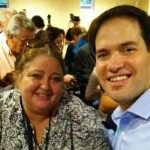 to the English speaking press. And Rubio stayed for about an hour afterwards, making three rounds to shake everyone’s hand and take selfies with the mother of the city manager, someone’s babies, children of neighbors and a series of giddy abuelas.
to the English speaking press. And Rubio stayed for about an hour afterwards, making three rounds to shake everyone’s hand and take selfies with the mother of the city manager, someone’s babies, children of neighbors and a series of giddy abuelas.
And a blogger-turned-fangirl who used to work at the same K-mart as his mom.

